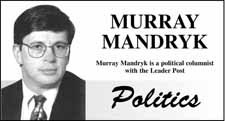The line between public sector union greed and government stinginess in times of prosperity isn't really all that fine after all.
Or at least, the line isn't that fine when you consider how far apart the unions and the government are right now in the two labour disputes in the province:
Teachers are asking for 12 per cent in the first year of their next contract with an undisclosed amount in later years. The government is countering with 5.5 per cent over three years.
Members of the Health Sciences Association of Saskatchewan (HSAS) - representing everyone from paramedics to occupational therapists to public health inspectors - are asking for 18 per cent over four years. The government is countering with 7.5 per cent over four years.
It would seem easy to conclude that the problem here is union greed. Given the size of the demand, such a criticism isn't completely without foundation.
The notion that teachers believe they deserve 12 per cent is simply a non-starter. Similarly, that HSAS members somehow think they are meritorious of wages more than double the inflation rate for the next four years is almost as ridiculous.
And what many taxpayers find most galling is that the demands seem to almost exclusively be driven by the province's recent prosperity. Just because Saskatchewan has suddenly come into a bit of cash, is it reasonable to spending it all on union wage hikes? What about the public debt? The need to cut taxes, build hospitals and fix schools?
What happens if - God forbid - we should again see a sudden dramatic downturn in the economy and are stuck with high civil services wages we can't afford to pay? Wouldn't we have to start laying off teachers, as is now happening in Alberta?
But as is the case with most disputes involving government, there are two sides to the story.
First, as hideous as the unions' wage requests are, we should remember this it's all part of negotiating strategy.
In the case of the teachers' 12-per-cent demand, it seems like a particular bad strategy. Not only is it too much, but it also flies in the face of the teachers' arguments that this dispute is really about the kids and the future of the province. However, the teachers' negotiating tactic has traditionally been to make a ridiculously high demand in the first year and have ample rule to come down from that request. Really, it's the government that hasn't moved much off its initial offers.
Second, given that the Saskatchewan Union of Nurses did get more than 12-per-cent in the first year, teachers and other health workers do have an argument that government can afford higher wages. Buttressing this argument for health workers in particular is the outrageous 40-per-cent-wage increases some health region CEOs and managers have received.
Third, the less-than-inflation-rate increase being offered by the government doesn't seem to be especially appreciative of the services provided. And while the government contends the high nurse salary increases reflected the desperate shortage of nurses, there's an interesting argument that other professions may be losing quality people simply because of less-than-inflation-rate wage demands.
This takes us to the final and perhaps most critical point. When teachers and health care workers had to contend with zero-, two- and two-per-cent wage increases in the early part of last decade, it was to deal with the difficult financial situation of the province.
Well, Premier Brad Wall and his government content such tough times are a thing of the past. So shouldn't those that took low wage settlements in the past when times were tougher not have some expect something a little better when times are good?
Of course, the unions' demands are unreasonable. But there again, maybe the government's offer could be a little more reasonable as well.
Murray Mandryk has been covering provincial politics for over 15 years.




